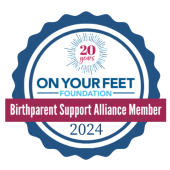
An adoption home study is a comprehensive assessment conducted by a licensed social worker or agency representative. This process includes evaluating the family’s living situation, interviewing the household members, and reviewing the family’s background. The purpose is to ensure that the home environment is safe, nurturing, and supportive for a child.
While this is a necessary and important step in the adoption process, it is normal for families to feel overwhelmed or intimidated by it as it involves many steps and a lot of paperwork. Most agencies will provide you with a home study checklist or guideline to help you through the process. This checklist can help you understand how to gather necessary documentation, prepare your home, and feel confident during the visit.
Items on Your Adoption Home Study Checklist
- Household Safety and Space: Safety is a top priority. Make sure your home is free of hazards, with basic safety measures in place like smoke detectors, fire extinguishers, and child-proofing for families planning to adopt a younger child. Clean, organized, and welcoming spaces help demonstrate that your home is ready to be a safe, happy place for a child.
- Background Checks: Expect background checks for all adults in the home, often including fingerprinting and child abuse registry checks. These are standard requirements to ensure a safe environment.
- Medical Evaluations: A health evaluation for each household member, which includes their health history, prescribed medications, and physician’s statement indicating the person does not have any conditions that would impede their ability to parent, is typically required. This shows the adoption agency that your family is healthy and capable of providing a stable home.
- Financial Documentation: You will provide documents that demonstrate your financial stability, such as recent pay stubs, tax returns, or other evidence of income. The goal of this is to demonstrate you can provide for a child’s needs.
- References: The agency will ask for references from people who know your family well, often including relatives and friends. This is an opportunity for those close to you to share their personal experiences with you and why they believe you would be a great parent.
- Parenting and Family Values Discussions: Be prepared for a discussion about parenting styles, discipline methods, and family values. Social workers want to understand your vision for family life and your readiness to handle the responsibilities of parenthood.
Addressing Common Concerns About the Home Study
1. What If We Don’t Have Everything Perfect?
- Focus on Readiness: The key is demonstrating readiness to welcome a child, even if every detail is not flawless. Families should present themselves as they are—genuine and eager to provide love and support.
- Open Dialogue: If there are areas of concern, families can openly discuss them with the social worker. This transparency can lead to constructive discussions about potential solutions or resources.
2. Will We Be Judged?
- Supportive Role: Social workers aim to support families through the adoption process, not to criticize them. Their goal is to assess readiness and provide guidance, not to pass judgment.
- Creating a Partnership: Families should view the social worker as a partner in their adoption journey. Building a rapport can help alleviate fears of judgment and foster a collaborative relationship.
3. How Do We Handle Difficult Questions?
- Reflecting on Personal Experiences: Consider past experiences that have shaped parenting philosophies. It’s natural to learn from what you’ve been through before. Sharing that with your social worker helps give insight into your own strengths.
- Be Honest: Social workers don’t expect perfect people. They recognize that everyone has gone through different life experiences. Being honest about challenges can illustrate resilience and growth.
What Happens After the Home Study Visit?
1. Report Compilation by the Social Worker
- Thorough Review: The social worker will review all aspects of the family’s preparedness, including home safety, background, and emotional readiness to adopt.
- Documented Information: The report will include a comprehensive profile of the family, covering everything from personal history to reasons for pursuing adoption.
- Timelines: The time it takes for the report to be completed can vary, but families will typically be informed of the expected timeline during or after the home visit.
2. The Home Study Review Process
- Review by Agency: Depending on the agency, the home study report may need approval from supervising team members or other involved adoption agencies, if applicable, before proceeding.
- Potential Follow-Ups: In some cases, additional questions or follow-up visits may be required if more information is needed. Families can use this opportunity to provide any clarifications.
3. Receiving Approval
- Adoption Eligibility: Approval means that the family has met all the criteria to adopt and is now eligible to adopt.
- Next Steps: Once approved, families can begin working with their adoption agency to be matched with a child, or they may proceed with other parts of the adoption process, depending on the type of adoption they are pursuing.
Using the Adoption Home Study Checklist for a Successful Home Visit
The adoption home study checklist is a vital tool for preparing your family and home for the adoption process. Staying organized, addressing concerns, and maintaining open communication with your social worker enables families to confidently approach the home study and move one step closer to bringing a child into their lives. This process focuses on creating a safe, loving environment for a child, and the checklist serves as your guide to achieving that goal.
For those considering adoption and seeking guidance, we invite you to visit our website at Adoption Center for Family Building or contact us at Contact Us.





